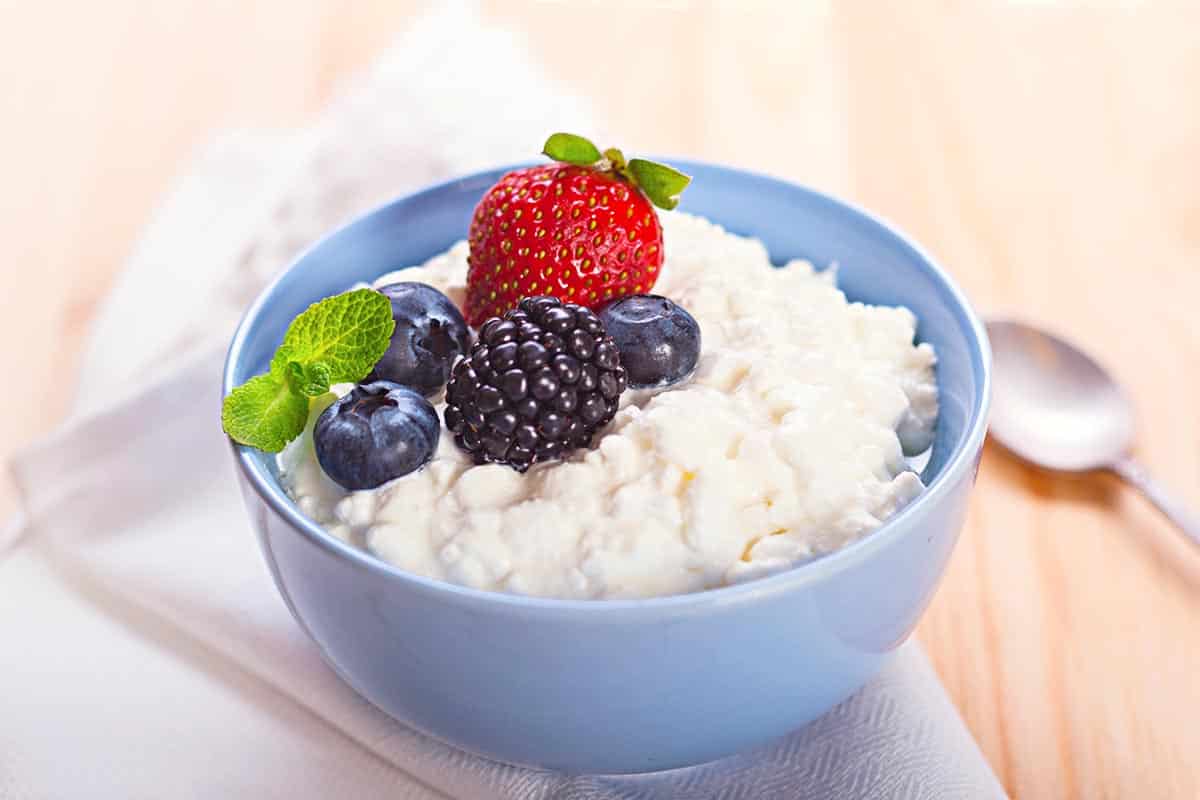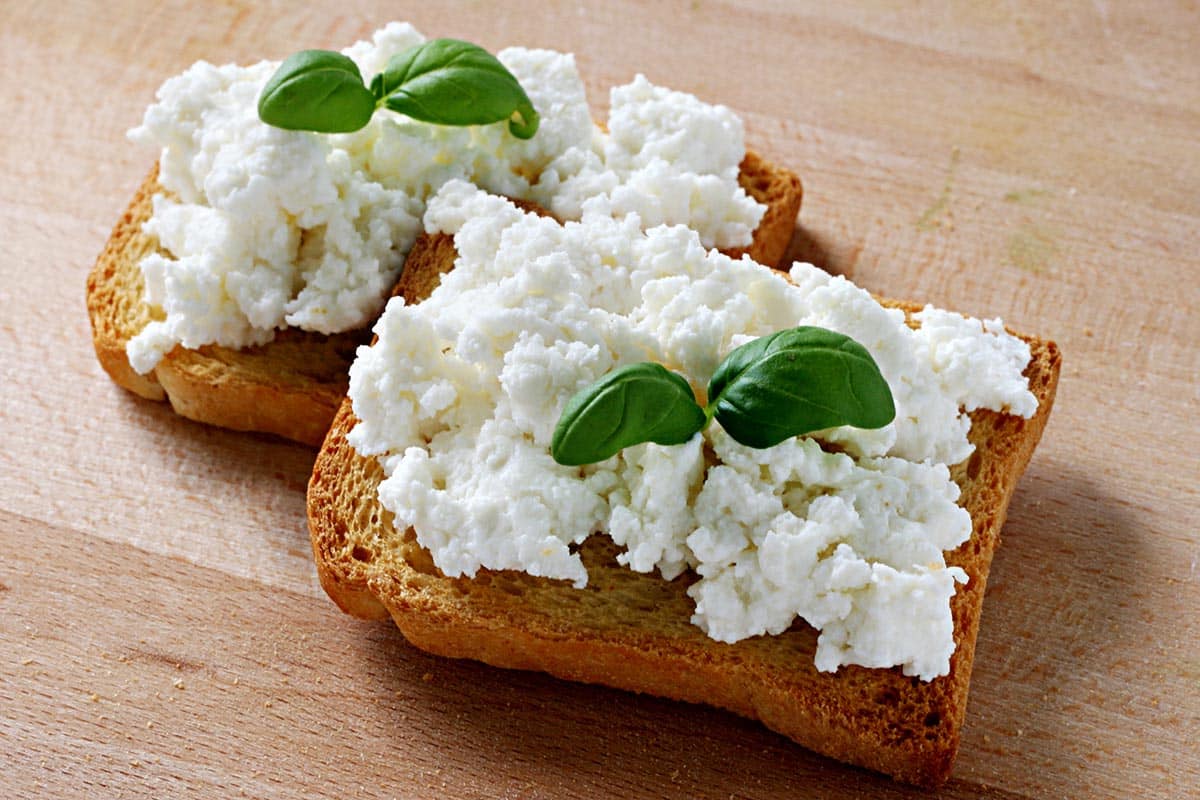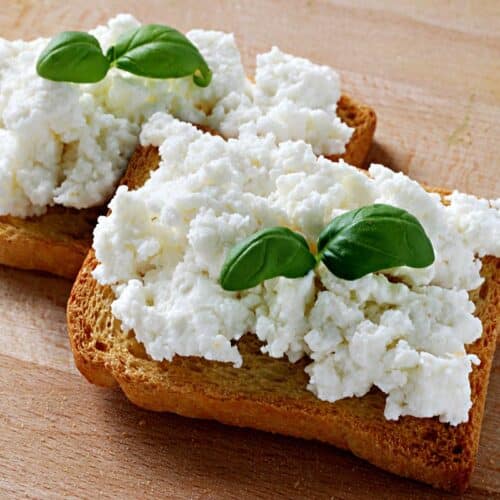Cottage cheese is among the most popular kinds of cheese. You’ll find containers of this cheese stacked on the grocery shelves. What does cottage cheese taste like?
This fresh cheese curd product sure looks like ricotta cheese, but does it taste like it? What do you eat it with? This article will answer most of your questions about this well-loved cheese.

Cottage cheese is a mild-tasting cheese product made from curds of pasteurized cow’s milk. It has a crumbly texture and can be eaten on its own or used as an ingredient in recipes.
This unripened cheese is white and creamy. Regarding texture, cottage cheese is lumpy because of the cheese curds.
Unlike other kinds of cheese, cottage cheese does not have a PDO designation. The absence of this designation means that anyone can make it. And for this reason, you can find all sorts of cottage cheese.
There is no uniform texture, distinct color, or signature flavor.
You can find cottage cheese in most grocery stores and online retailers. If you have plenty of time, you can make your own and decide how you like it.
How Cottage Cheese Got its Name
Cottage cheese got its name because people used to make it in their cottages. Back then, people made their own butter from the milk they got from their farm animals.
After making butter, they make this cheese from whatever milk they have left.
Cottage cheese is also called Dutch cheese. It is a fresh cheese, which means that it does not undergo the process of aging.
Cottage Cheese Varieties
There are different kinds of cottage cheese with small, medium, and large curds. And, of course, variations such as sodium-free, lactose-free, and low-fat cottage cheese exist.
There is also creamed cottage cheese, which of course, contains additional cream. Whipped cottage cheeses are also a thing.
Cheesemakers start with milk when making cottage cheese. This milk is usually whole milk or skimmed milk.
They warm the milk up and then add an acidic liquid which is either vinegar or lemon juice. In some cases, people opt for rennet to coagulate the milk.
The acid causes the curds to separate from the whey. This process divides the mixture into two parts: solid and liquid.
Cheesemakers drain the curds and wash them to arrive at cottage cheese.
At this point, you can already enjoy it or add some salt and cream to make the cheese more flavorful. Some like to add herbs and spices like black peppers, sesame seeds, or minced chives.
So, what does cottage cheese taste like? Cottage cheese has a mild flavor because it is fresh and not aged. Because of this, some people find this cheese bland and lacking in flavor.
But the milk taste translates to this cheese, so it is creamy. And lastly, cottage cheese also has hints of a tangy flavor due to the use of acids.
For this reason, people often compare its taste to sour cream. And when you taste cottage cheese, it might remind you of Greek yogurt.
Like other food items, the taste of cottage cheese also depends on its ingredients. If the cheese contains salt, you’ll get a hint of that salty flavor.
Meanwhile, cottage cheese that has added cream will taste more decadent.
Those recipes that contain herbs will also taste like whatever is in them.
The great thing about cottage cheese is that there are many kinds to choose from. You can certainly find a brand that will be okay for your taste. And, if you don’t find something that tastes good, you can always make your version.
You can never go wrong with pairing cottage cheese with toast like any other cheese. The mouthfeel of the creamy texture of the cheese against the crisp toast is too good not to try.
If you like cottage cheese on toast, you’ll probably like it on top of crackers as well. Put a dollop of this creamy cheese on top of your favorite cracker and enjoy.
Saltines and Ritz crackers are top choices. Graham crackers also work for this purpose.
Eggs are also a great pairing idea for cottage cheese. Having it alongside toast or bread will give you a filling, satisfying, and delicious meal.
Whether it be a sunny-side up, scrambled, or poached eggs, they’ll taste great with cottage cheese.
Cottage cheese pairs incredibly well with fruits. Make cottage cheese and fruit jars, and pair it with tropical fruits like bananas, pineapples, and melons.
Or, opt for berries like strawberries, blueberries, and blackberries. Apples and peaches are also top choices.
Of course, eating cottage cheese with other kinds of cheese also works. Among the best types of cheese to pair with this cheese are parmesan and feta cheese.
The flavors of these cheeses would be great in a lasagna recipe.
Unsurprisingly, cottage cheese also pairs well with meats. You can use it in recipes that call for chicken, pork, and beef.
Other than that, this cheese also tastes great with gamey meats like lamb and venison.
Cottage cheese is also great with nuts like walnuts, pistachios, and almonds. Cashews are a great option for an added protein boost, too.
Eat your cottage cheese with some seeds to add texture and flavor. Pumpkin, sunflower, and poppy seeds can give it some crunch and lend a depth of flavor.
Yup! We all know that wine pairs well with cheese. But did you know that cottage cheese is perfect with rosé or sparkling rosé? Pinot Grigio and Pinot Noir are also a must-try!

Cottage cheese can lend a layer of flavor and improve the texture of your baked goods. Add them to your muffins, buns, or cookies.
Lasagna is another baked treat that will taste good with some cottage cheese.
For a unique twist on your classic smoothies, use some cottage cheese. Since this cheese pairs well with many fruits, putting it in your smoothies makes sense.
You can add it to a chocolate smoothie if you’re up for it. This recipe here uses cocoa and coffee powder for a delicious protein smoothie.
Cottage cheese tastes great anywhere, even in salads. Put some cottage cheese in your mix of avocado, cucumbers, and cherry tomatoes. Add a dash of lemon juice and season with pepper to taste.
Does fresh cottage cheese taste good in pasta? Yes, it does. You can make an extra special Alfredo or a super creamy tomato-based pasta sauce with the aid of this cheese.
Enhance not only the flavor but also the texture of your dips with cottage cheese. Blend this cheese with garlic powder, onion powder, and some dried dill. Finally, season with salt and ground black peppers.
You’ll have a dip that goes well with chips, crackers, and carrot sticks.
Cottage cheese is the perfect ricotta cheese substitute for a ravioli filling. Using cottage cheese to fill these hollow pasta pieces comes with a bonus: lower calories!
What do you get when you add cottage cheese to your regular pancake batter? Extra yummy and fluffy cottage cheese pancakes that you won’t get enough of.
Top them with fresh fruits and a healthy drizzle of honey and maple syrup for a perfect coffee companion.
Replace cream cheese with cottage cheese for a healthier dessert. Because of its lumpy texture, you’d have to use a blender or a food processor to achieve a similar consistency.
The resulting cheesecake will taste as good. So the extra step is worth it.
Cottage cheese is a powerhouse of vitamins and minerals. You’ll get vitamin B12, calcium, and selenium if you eat cottage cheese.
On top of that, you’ll also have phosphorus and folate. Cottage cheese also contains niacin and Vitamin A. And this cheese is low in fat and rich in protein, so it will make your meals healthier.
Do note that most regular cottage cheeses are high in sodium. If you worry about this, a low-sodium variety is a much better option.
It is also low in carbohydrates and calories, making it a great choice for those watching their waistlines.
Overall, cottage cheese is a nutritious and versatile dairy food that can provide numerous nutritional benefits. With its high protein content and essential vitamins and minerals, cottage cheese can help to keep you feeling full and nourished.
Cottage cheese stays good for only a short period as it is a fresh cheese. For this reason, you’ll often see this cheese in single-serve containers.
Be sure to open and consume cottage cheese before the date on its label. Once opened, store cottage cheese in the fridge in its original packaging. Doing so will make it last for at least 5 days.
Note that you should only take cottage cheese out of the fridge before you’ll use it. Never let it sit out for more than 2 hours. If in doubt, it is best to discard cottage cheese than risk food poisoning.
You can also freeze cottage cheese to extend its shelf life. But remember that frozen cottage cheese will lose its cream texture after you thaw it. Because of this, you should only freeze cottage cheese that you will eventually cook.
Though not an exact flavor match, ricotta cheese is a close alternative to cottage cheese. Ricotta cheese is just a bit creamier and thicker. But it will do a good job of replacing cottage cheese in most recipes.
Try using ricotta cheese instead of cottage cheese in pasta sauces and smoothies. You might never go back.
Greek yogurt is among the best if a non-cheese alternative to cottage cheese is more to your taste. It ticks almost all the boxes: tangy, creamy, and healthy. Just note that Greek yogurt lacks the salty taste and the chunky texture.
Despite these, Greek yogurt can step in for cottage cheese in dips and salad dressings.
Go for cream cheese if you need something more spreadable than cottage cheese. Cream cheese has a similar salty and slightly sour flavor. It is accessible as well, making it a convenient replacement for cottage cheese.
Use cream cheese in place of cottage cheese as a spread or as an ingredient in sauces and dips.
In some ways, cottage cheese tastes like yogurt. This cheese is creamy and tangy, making it similar in flavor to yogurt. But most cottage cheeses are salty; this is where the difference comes in. In most recipes, though, you can replace cottage cheese with yogurt and vice-versa.
No. Cottage cheese does not taste like feta. Crumbled feta and cottage cheese may look alike, but these two do not necessarily taste the same. For starters, feta is an aged cheese, so it does have a sharper flavor than cottage cheese. Feta is also saltier because it undergoes a brining process.
A bit. Cottage cheese and ricotta cheese are both creamy and slightly tangy. But ricotta tends to be sweeter, while cottage cheese is usually salty. A salted version of ricotta, ricotta salata, is a closer flavor match to cottage cheese.
No. Cottage cheese does not melt. At least not like some cheeses like cheddar and mozzarella cheese would. It does soften with heat, and that way, it perfectly blends with sauces and dips. You might have to mash the curds, though, if you don’t want lumps in your recipe.
No. Cottage cheese comes from milk, so it is not vegan or vegetarian. Don’t worry; creative people have come up with vegan cottage cheese. Vegan cottage cheese commonly uses silken tofu and tastes just as great.
Natural cottage cheese is gluten-free. However, some commercial brands use gluten-based ingredients to improve taste and texture. It is always best to check the label to see if your cottage cheese is gluten-free. Better yet, make your own cottage cheese so you’ll be absolutely sure it is gluten-free.
So, what does cottage cheese taste like? Cottage cheese is a fresh cheese, so it does not have a sharp flavor. Instead, it tastes mild – the perfect blend of creamy and tangy, with hints of saltiness.
Because of this flavor profile, cottage cheese is a versatile ingredient. You can eat it with almost anything, from crackers to nuts. Add it to lasagna, pancakes, and even ice cream. You are definitely missing out if you’ve never tasted cottage cheese yet.






